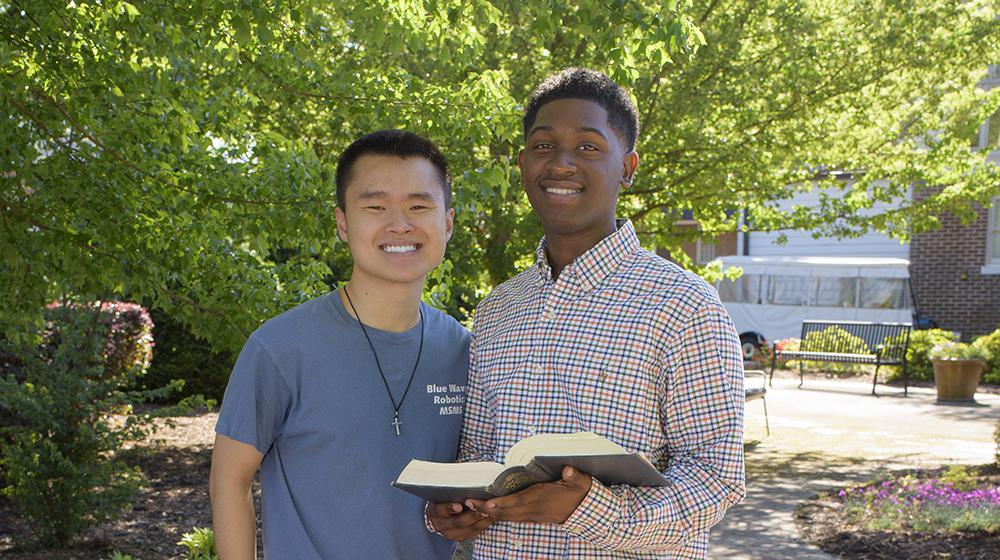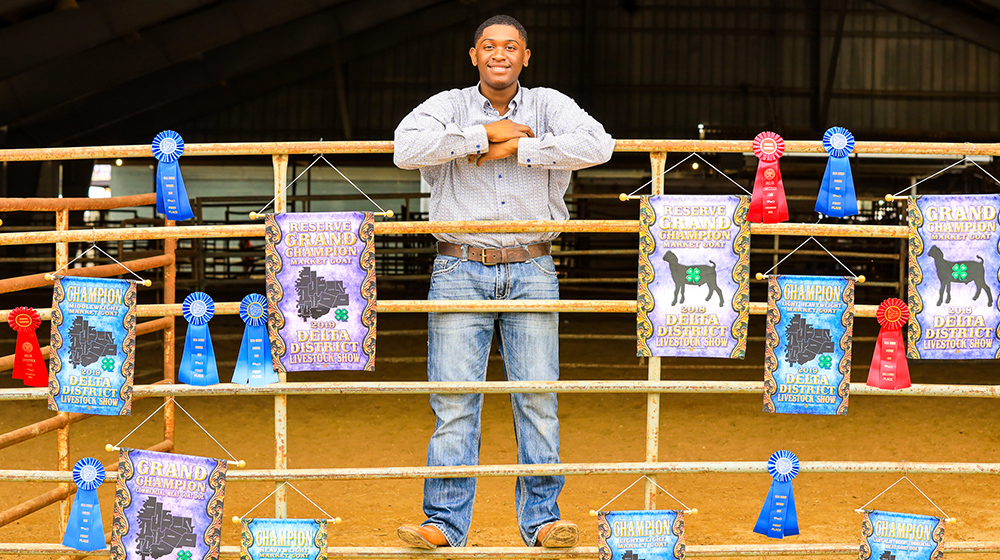Growing a Champion

4-H’er earns his spot at the top
Story by Keri Collins Lewis • Photo by Kevin Hudson
“You know that saying, ‘It takes a village to raise a child’? Well, it takes a village to raise a goat, because it’s a kid!” Tyler Branch says with a smile.
A senior at the Mississippi School for Math and Science, Tyler knows this truth from experience. His 4-H career centered around showing Boer goats.
Tyler lists people who influenced him: His parents, Angela Love and Cedric Branch. Betsy Padgett, his MSU Extension 4-H agent in Holmes County. His cousin Heidi. Kipp Brown, an Extension agent with goat expertise. Gene Grantham, who sold him his first goats and became an honorary grandmother. Jesse Cornelius, a goat breeder. Kylee and Tracy Killebrew, a 4-H’er and her mom. He happily shares credit with everyone, including the competitors he counts as friends, such as Alex Bynum.

While Tyler first experienced 4-H as a 5-year-old showing a hog in the Holmes County livestock show’s “pee-wee” contest, he started showing goats in the fourth grade. By his senior year of high school, he had amassed an impressive collection of banners, trophies, ribbons, and a belt buckle from the 2019 Dixie National Sale of Junior Champions.
At the champion drive in 2018, his goat Cosmo was named reserve champion in his class.
“The judge walked over and picked the champion,” Tyler recalls. “Then, he came to me, and everyone started screaming. I’d made it to the sale! I said I wasn’t going to cry, but, when I walked out of the ring and saw my family, the tears were coming. Mom was crying; Ms. Betsy, too.”
One of Tyler’s two goats in the 2019 sale was named reserve grand champion for all goat classes.
Though he first joined 4-H because his mom wanted him involved in something positive, that changed as he got older.
“I wanted to do it for myself,” he asserts. “And I did everything Ms. Betsy suggested: dairy products judging, livestock judging, Project Achievement Day, grilling contests. I didn’t want to say no when she told me about something!”
Padgett has worked with Tyler for half of her MSU career and says he makes her job a joy. She lists the activities he left out: Horse Bowl, Livestock Bowl, Robotics Academy, 4-H State Congress and National 4-H Congress, Legislative Day, 4-H S.A.F.E.T.Y., which is the Safe Archery and Firearms Education and Training for Youth program, and the county 4-H leadership group, Leadership for Life.
“You’d be hard pressed to find one individual who showed against him or participated in 4-H with him who doesn’t love and admire him,” Padgett asserts.
“He was an intense showman, always striving to do his best, congratulating those who beat him, and a humble, gracious winner.”
Padgett explains that Tyler made a difference simply by being himself.
“His eager participation, his enjoyment of the process, and his acceptance by everyone he met broke down invisible barriers and brought so many more children to our 4-H livestock and horse program,” she says.
Through 4-H, Tyler says he learned about life.
“I had to buy the goats, buy feed, and take them to the vet, so that took the place of something else I might want to do or have. But that’s a good thing to learn— if you want something bad enough, you may have to sacrifice something else to get what you want,” Tyler observes.
He plans to major in biochemistry at Mississippi State University, and he’s aiming for a career in veterinary or human medicine.
“I went from showing goats using dog collars and pans from Fred’s to feed them to being reserve grand champion at Dixie,” he says. “4-H taught me I can do anything want to do if I work for it and try.”


